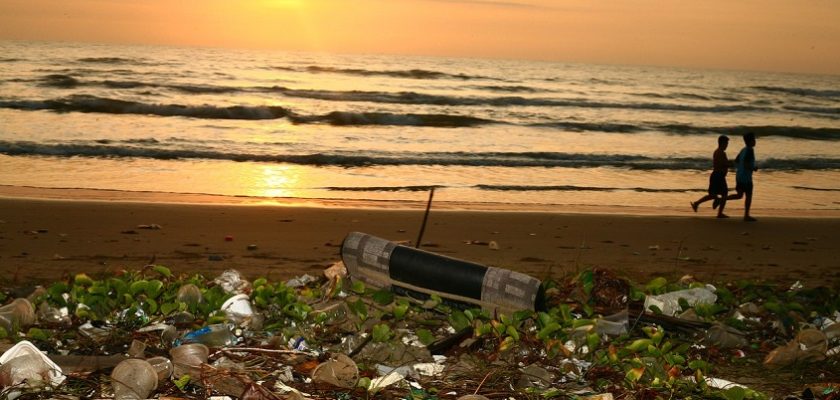The Impact of Plastic Pollution on Marine Life and Ways to Reduce Plastic Waste
- Posted on January 10, 2023
- By Vishakha Yadav
- Read 3 minutes

Plastic pollution refers to the presence of plastic debris, both microplastics and macroplastics, in the environment, including oceans, rivers, lakes, and on land. Plastic pollution is a growing global problem that poses a threat to marine life, wildlife, and human health.
Importance of marine life: Marine life plays a vital role in maintaining the balance of the earth’s ecosystems. They provide food for many species, including humans, and help regulate the earth’s climate. In addition, marine life serves as an important source of recreation and tourism revenue.
Overview of the impact of plastic pollution on marine life: Plastic pollution in the ocean has a significant negative impact on marine life. It harms marine animals through entanglement and ingestion, disrupts food chains, alters habitats, and causes damage to the fishing and tourism industries.
Impact of Plastic Pollution on Marine Life
Physical harm to marine animals
Entanglement in plastic debris: Marine animals, such as sea turtles, whales, and dolphins, can become entangled in plastic debris such as discarded fishing nets, plastic bags, and six-pack rings. This can cause injury and death by drowning, suffocation, and starvation.
Ingestion of plastic waste: Marine animals can also ingest plastic debris, which can cause physical harm and death. Plastic particles can block the stomach, causing starvation, and release toxic chemicals that can be harmful to their health.
Ecological impact
Disruption of food chains: Plastic debris can be mistaken as food by marine animals, leading to their ingestion and potentially killing them. This can disrupt the food chain by removing a key species and altering the balance of the ecosystem.
Alteration of habitats: Plastic debris can also cause physical damage to marine habitats, such as coral reefs, by smothering them, and making it difficult for the organisms that live there to survive.
Economic impact
Damage to fishing and tourism industries: Plastic pollution can also harm the fishing and tourism industries by catching fish and other seafood in plastic debris, and by deterring tourists from visiting areas affected by plastic pollution.
Causes of Plastic Pollution in the Ocean
Littering on land: A significant amount of plastic waste ends up in the ocean as a result of people littering on land. Plastic bags, bottles, and packaging materials are frequently carried away by wind or rainwater into storm drains, which eventually empty into rivers and oceans.
Improper waste management: Improper waste management is another major cause of plastic pollution. Plastic waste that is not properly disposed of, such as by not being placed in designated trash bins, can also end up in the ocean.
Marine-based sources, such as shipping and oil rigs: Marine-based sources such as shipping, oil and gas extraction, and aquaculture operations can also contribute to plastic pollution in the ocean. For example, plastic debris can be lost during transit, or plastic waste can be discarded by ships or oil and gas platforms.
Ways to Reduce Plastic Waste
Personal action
Reduce, reuse, recycle: One of the most effective ways for individuals to reduce plastic waste is to use less plastic by choosing to buy products with less packaging, and to recycle or compost when possible. This means avoiding single-use plastics such as straws, plastic bags and bottles, and opting for reusable alternatives.
Support laws and regulations that curb plastic pollution: Individuals can also support local, national, and international laws and regulations that aim to reduce plastic pollution, such as plastic bag bans, deposit return schemes and plastic tax.
Educate others about the problem: Raising awareness about the negative impacts of plastic pollution and encouraging others to reduce their plastic waste can also make a significant difference.
Business action
Implementing recycling and waste reduction programs: Businesses can implement recycling and waste reduction programs in their operations and encourage their customers to recycle or compost as well.
Adopting sustainable packaging: Businesses can also adopt sustainable packaging, such as biodegradable or compostable packaging materials, or using innovative packaging alternatives that can be reused or recycled.
Government action
Setting policies and regulations: Government plays a crucial role in reducing plastic waste through policies and regulations such as limiting the use of certain types of single-use plastics, setting targets for waste reduction, and promoting recycling and composting.
Funding for research and cleanup: Governments also have a role in providing funding for research on new technologies to manage and recycle plastic waste, as well as funding for cleanup initiatives, especially in remote areas where plastic pollution is more acute.
